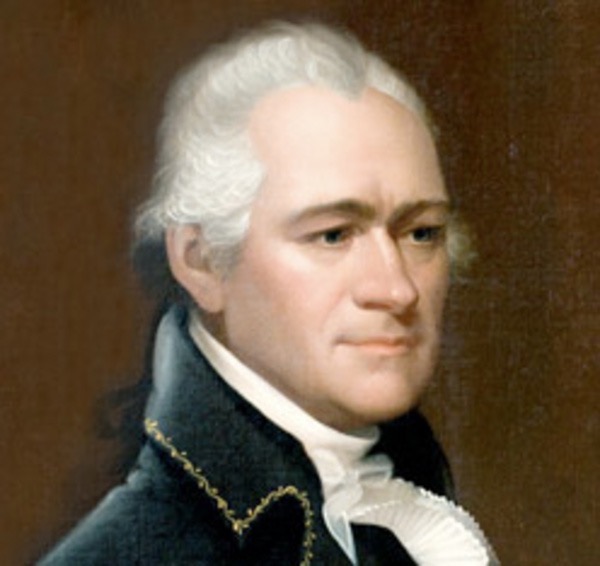
"What does the line Oceans Rise, Empires Fall actually mean?"

Scott, thanks for the question. This line, a leitmotif1, is repeated in all three of the King George's songs. First let's try to date them on the Revolutionary War Timeline.
Song #1 You'll Be Back:
This song has to take place sometime between 1773 - 1776. Most likely after the Boston Tea Party and before the last signature was inked on the Declaration of Independence (8/17/1776). The King refers to crying in your tea and sending a battalion to kill everyone you love.
You'll be back, time will tell.
You'll remember that I served you well
Oceans Rise, Empires Fall.
We have seen each other through it all.
And when push comes to shove
I will send a fully armed battalion to remind you of my love!
Song #2 What Comes Next:
This one is easy, September to October, 1781 – the Battle of Yorktown. The last real battle and practical end of the revolution. We won, now what?
You're on your own.
Awesome. Wow.
Do you have a clue what happens now?
Oceans Rise, Empires Fall
It's much harder when it's all your call.
All alone, across the sea
When your people say they hate you. Don't come crawling back to me.
Song #3 I Know Him:
Another easy one to date - 1797, John Adams elected President.
That poor man,
they're gonna eat him alive!
Oceans Rise, Empires Fall
Next to Washington, they all look small.
Each song turns up at a major inflection point in America's birth story/myth. The Declaration of Independence, the Battle of Yorktown and the first real "contested" presidential election2. At each point King George seems to be whistling in the dark. Imagining the colonies will return to him, waiting for the new country to implode and finally confident that no one will be able to lead the new country besides George Washington.
Another factor to keep in mind is King George and Bishop Samuel Seabury are the only characters whose roles are played exclusively by white actors. They represent the Old World and the way things were. The rest of the cast represents the New World and the way things we hope will be in the future.
King George's songs are quite unique, reminiscent of the Beatles or old show tunes. Nowhere near the world of rap or hip-hop. Lin Manuel also turns lyric and melody upside down here by going down a few notes on the word "rise" and jumps way up the scale on the word "fall" – similar to writing white text on a dark background. At a 2016 screening of Mary Poppins, Miranda admitted he stole this idea from the Sherman brothers who used it in "A Spoonful of Sugar."
As far as I can tell Lin hasn't publicly commented on this line. However, many others have. I would say the consensus is - the line Oceans Rise, Empires Fall refers to the natural ebb and flow of the Universe. Oceans rise (and fall) with the tide. Empires fall (and rise) with the vagaries and vicissitudes of political fortune. Perhaps King George opines, "Who am I to go against the tide of history?" He is also consoled by the knowledge that the new republic will also be bound by nature's unalterable progression.
Some folks have also connected the line to the tale of King Cnut (Kuh-NYoot). Cnut The Great (c. AD 996-1035) was the king of Denmark AND England. He attempted to rebuke the fawning of his courtiers by commanding the tides to cease rising and falling. An effort to show the powerlessness of a king compared to god's power. An allusion, perhaps, that even Great Britain might not be that Great.
Scott, I hope this gives you some insight into the line that has caught many people's attention. It's important to keep in mind however that nothing is written in stone and sometimes even authors aren't sure why they said what they said. But if it catches people's attention they deserve to take the win. Thank you for sharing your question and taking the Hamilton Musical Tour.
1 - noun: leitmotif; plural noun: leitmotifs; noun: leitmotiv; plural noun: leitmotivs
a recurrent theme throughout a musical or literary composition, associated with a particular person, idea, or situation."there are two leitmotifs in his score marking the heroine and her Fairy Godmother"
2 - George Washington ran unopposed for president in both the 1789 and 1792 elections.
